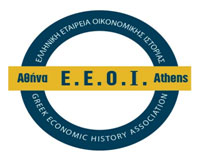Conference’s Review
Katerina Papakonstantinou, “Oi ‘Agores’ kai i Politiki”, Ta Istorika 56 (June 2012), p. 243-249.
The Greek Economic History Association in collaboration with the University of Thessaly organize a conference titled “Markets” and Politics: Private Interests and Public Authority (18th-20th c.) and hopes to trace the historical evolution of this complex power relationship, over the period when contemporary capitalist economies were shaped, from the late 18th century until today.
The conference will be held in Volos, University of Thessaly, Department of History Archaeology and Social Anthropology (Papastratos Tobacco Warehouse in Volos strand, Amphitheater Saratsis), 10-12 February 2012.
Languages of the conference: Greek, english, french
Deadline for submission title and abstract: 1/6/2011
Date of acceptance: 30/6/2011
Deadline for submission of papers: 31/12/2011
These days, the economy seems to have become completely dominant over all other fields of social life. Politics, in particular, seems unable (or unwilling) to intervene in “markets”, presenting them as an overwhelming exogenous entity, to whose logic all people and societies must conform. How did this asymmetric relationship emerge? In which ways, and in what broader social context, did economics and politics – i.e. their agents and subjects – converse, converge or influence each other, and negotiate interests, power and ideological hegemony?
The conference will focus on the following four broader themes:
1. Economic theories: means of diffusion, reproduction and popularisation.
This concerns the processes whereby economic theories are constituted and reproduced, not only within academia, but also in the broader public sphere, and how public “economic culture” is shaped. Of particular interest is the process whereby market ideology assumed its ideological prominence in social science, as well as in political and public discourse.
2. Power relationships: negotiation, pressure and coercion
What is sought here, are the various means, formal/institutional or informal, legal or illegal, whereby private economic agents seek to influence or force politicians and policies: from sovereign debt, lobbying and the covert or overt funding of politicians, to any kind of organised moves of extortion. Conversely, the means by which politics/politicians seek to impose, negotiate or secure consent for state interventions in the private sector.
3. Linkages and networks of communication
The participation of entrepreneurs in politics and, conversely, the participation of politicians in entrepreneurial formations was a common phenomenon in the 19th century. Today, it is said that politics has become professionalized. How independent, however, are the two fields? What role do social networks of communication between the two “worlds” (political and economic) play? What is the role of personnel mobility from one field to the other, both at the leadership and bureaucratic level, between the state and economic institutions? How do such linkages become legitimised in each historical period?
4. Market embeddedness in economy and society and the role of political practices
A dominant strand of thought today, pretends that markets are decoupled from social processes. In fact, the reproduction of the capitalist system necessitates the institution of rules and norms that allow markets to operate unhindered. This reproduction cannot operate in a political vacuum, even if the current political discourse presents itself subjected to the inescapable logic of the markets. What was the role of politics historically in the creation of the preconditions for the operation of the market system? How did it respond when the market system was in a crisis?




